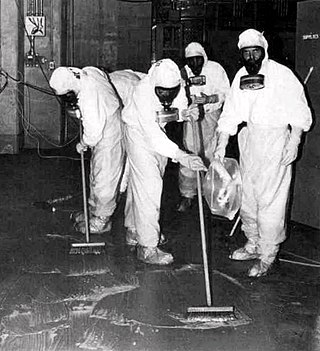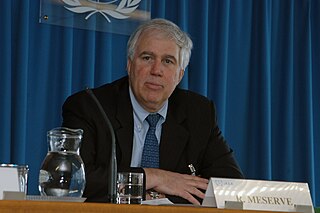
The Nuclear Regulatory Commission (NRC) is an independent agency of the United States government tasked with protecting public health and safety related to nuclear energy. Established by the Energy Reorganization Act of 1974, the NRC began operations on January 19, 1975, as one of two successor agencies to the United States Atomic Energy Commission. Its functions include overseeing reactor safety and security, administering reactor licensing and renewal, licensing radioactive materials, radionuclide safety, and managing the storage, security, recycling, and disposal of spent fuel.
The Union of Concerned Scientists (UCS) is a nonprofit science advocacy organization based in the United States. The UCS membership includes many private citizens in addition to professional scientists. Anne Kapuscinski, Professor of Environmental Studies and Director of The Coastal Science and Policy Program at the University of California—Santa Cruz, currently chairs the UCS Board of Directors, having replaced James J. McCarthy, Professor of Biological Oceanography at Harvard University and past president of the American Association for the Advancement of Science in 2015.

The Duane Arnold Energy Center (DAEC) was Iowa's only nuclear power plant. It is located on a 500-acre (200 ha) site on the west bank of the Cedar River, two miles (3.2 km) north-northeast of Palo, Iowa, USA, or eight miles (13 km) northwest of Cedar Rapids.

The International Nuclear and Radiological Event Scale (INES) was introduced in 1990 by the International Atomic Energy Agency (IAEA) in order to enable prompt communication of safety significant information in case of nuclear accidents.

Nuclear safety is defined by the International Atomic Energy Agency (IAEA) as "The achievement of proper operating conditions, prevention of accidents or mitigation of accident consequences, resulting in protection of workers, the public and the environment from undue radiation hazards". The IAEA defines nuclear security as "The prevention and detection of and response to, theft, sabotage, unauthorized access, illegal transfer or other malicious acts involving nuclear materials, other radioactive substances or their associated facilities".
Nuclear history of the United States describes the history of nuclear affairs in the United States whether civilian or military.

Nuclear safety in the United States is governed by federal regulations issued by the Nuclear Regulatory Commission (NRC). The NRC regulates all nuclear plants and materials in the United States except for nuclear plants and materials controlled by the U.S. government, as well those powering naval vessels.

The Fukushima Daiichi Nuclear Power Plant is a disabled nuclear power plant located on a 3.5-square-kilometre (860-acre) site in the towns of Ōkuma and Futaba in Fukushima Prefecture, Japan. The plant suffered major damage from the magnitude 9.1 earthquake and tsunami that hit Japan on March 11, 2011. The chain of events caused radiation leaks and permanently damaged several of its reactors, making them impossible to restart. The working reactors were not restarted after the events.
Frank N. von Hippel is an American physicist. He is Professor and Co-Director of Program on Science and Global Security at Princeton University and the Princeton School of Public and International Affairs.
Kurt Gottfried was an Austrian-born American physicist who was professor emeritus of physics at Cornell University. He was known for his work in the areas of quantum mechanics and particle physics and was also a co-founder with Henry Way Kendall of the Union of Concerned Scientists. He wrote extensively in the areas of physics and arms control.

Joseph Mallam Hendrie is a former chairman of the U.S. Nuclear Regulatory Commission (NRC). On August 9, 1977 he was named to a four-year term on the Commission and designated as its chairman by President Jimmy Carter. From 1975 to 1977, Hendrie had served as chairman of the Department of Applied Science at Brookhaven National Laboratory.
Arnold "Arnie" Gundersen is a former nuclear industry executive, and engineer with more than 44 years of nuclear industry experience who became a whistleblower in 1990. Gundersen has written dozens of expert reports for nongovernment organizations and the state of Vermont. Gunderson was a licensed reactor operator from 1971-1972 on Rensselaer Polytechnic Institute's zero-power open-pool university research reactor at the Reactor Critical Facility in Schenectady, New York, where he was a nuclear engineering graduate student.

Gregory B. Jaczko is a physicist who was chairman of the U.S. Nuclear Regulatory Commission (NRC) from 2005 to 2012. While at the NRC, he voted against the opening of new nuclear plants; an inspector general report found that he sought unilaterally and improperly to block the Yucca Mountain nuclear waste repository project from advancing. After leaving the NRC, Jaczko called for a global ban on nuclear power.

The international reaction to the 2011 Fukushima Daiichi nuclear disaster has been diverse and widespread. Many inter-governmental agencies responded to the Japanese Fukushima Daiichi nuclear disaster, often on an ad hoc basis. Responders included International Atomic Energy Agency, World Meteorological Organization and the Preparatory Commission for the Comprehensive Nuclear Test Ban Treaty Organization, which has radiation detection equipment deployed around the world.
M. V. Ramana is professor and Simons Chair in Disarmament, Global and Human Security at the University of British Columbia, and Director of the Liu Institute for Global Issues, at the School of Public Policy and Global Affairs. A physicist by training, he previously worked at the Nuclear Futures Laboratory and the Program on Science and Global Security, both at Princeton University. Ramana is a member of the International Panel on Fissile Materials, the Canadian Pugwash Group, the International Nuclear Risk Assessment Group, and the team that produces the annual World Nuclear Industry Status Report.
David A. Lochbaum was the Director of the Nuclear Safety Project for the Union of Concerned Scientists (UCS). A nuclear engineer by training, he worked in nuclear power plants for nearly two decades. Lochbaum has written numerous articles and reports on various aspects of nuclear safety and published two books.
The Leo Szilard Lectureship Award is given annually by the American Physical Society (APS) for "outstanding accomplishments by physicists in promoting the use of physics for the benefit of society". It is given internationally in commemoration of physicist Leo Szilard.
"In the year's of Szilard's life and activity it became clearer than ever before how great the responsibility of scientists is to the society. And, to a large extent, it is due to Szilard that this awareness began to spread in the scientific community." - Andrei Sakharov

Richard Andrew "Dick" Meserve is an American lawyer and scientist. He served as Chairman of the Nuclear Regulatory Commission from 1999 to 2003 and served as President of the Carnegie Institution for Science from 2003 to 2014.
Susan Q. Stranahan is a journalist and co-author of several books, who writes primarily about energy and the environment. Stranahan was a staff writer for The Philadelphia Inquirer from 1972 to 2000 and served on the newspaper's editorial board. She was one of the recipients of the 1980 Pulitzer Prize for journalism as lead reporter for a Philadelphia Inquirer team that covered the Three Mile Island accident. She has taught environmental writing at the University of Pennsylvania.
Laura Grego is an American physicist specializing in nuclear safety and security and space policy. She is a senior scientist at the Union of Concerned Scientists, where she is research director of the Global Security Program.








